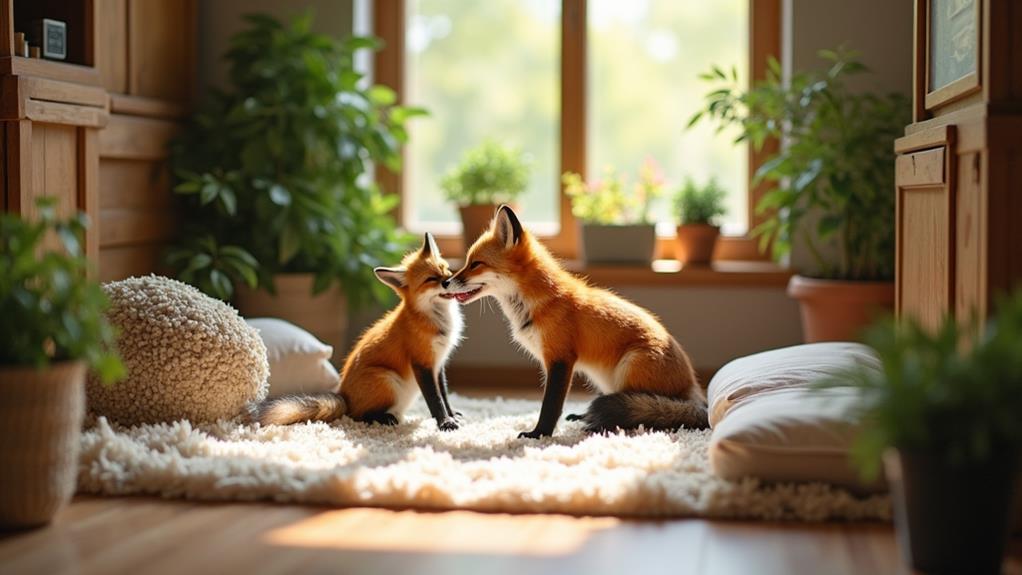Caring for a pet fox isn't your typical furry friend affair! You'll need to make sure you've got the legal green light, as only some states allow pet foxes. Your fox will need a secure enclosure—think at least 100 square feet, with sturdy fencing. A proper diet is key, filled with muscle meat, raw bones, and occasional doctor checks to keep them healthy. Socializing early helps them behave, and daily playtime keeps them happy and engaged. Oh, and be ready for some memorable vocal moments! Stick around, and you'll discover even more tips for rocking your fox ownership!
Contents
Legal Considerations for Fox Ownership

When considering a pet fox, it's important to understand that the legality of ownership can differ greatly across states. Only 14 states allow you to keep a pet fox, and many local rules can add another layer of complexity. You wouldn't want to find out the hard way that keeping a fox is illegal in your area, so it's vital to verify local laws before diving in.
Be sure to connect with your local wildlife departments. They can guide you through what's required to guarantee responsible ownership. In some places, you might need to obtain a license to keep your whimsical little companion.
Remember, you should only consider a captive-bred fox as a pet; wild foxes are off-limits and can lead to ethical dilemmas.
Also, different species of foxes may have unique legal considerations, so thorough research pays off. Let's face it: nobody wants to face fines or have their fox confiscated!
Owning a pet fox can be an extraordinary adventure, but you've got to stay informed to make it a safe and happy one for both you and your furry friend.
Proper Enclosure Requirements
A proper enclosure is vital for the well-being of your pet fox. When setting it up, remember that a minimum size of 100 square feet is necessary, with secure fencing made from at least 12-gauge welded wire. To keep your little friend safe, the enclosure must have a full top and bottom to prevent any sneaky escapes!
Here's what you should consider for your pet fox's enclosure:
- A designated sleeping area where they can curl up cozy and safe.
- Interactive structures and enrichment items to keep their minds sharp and entertained.
- Regular inspections to catch any potential escape routes, because no one wants a fox on the run!
You'll want to confirm the wire openings are no larger than 2×4 inches, and consider adding tunnels or shaded areas for extra fun.
Using a solid flooring option like concrete can help prevent digging. Your fox deserves a space that provides safety and mental stimulation—their happiness depends on it!
Keep their environment engaging, and you'll win over their little fox hearts with ease!
Nutrition and Dietary Needs

Providing your pet fox with the right nutrition is just as important as creating a safe and secure enclosure. A good diet for foxes should consist of about 65-70% muscle meat, with the rest made up of raw bone, offal, and liver.
You can also include high-quality, grain-free dog food—around 2 cups a day for adults, adjusting based on their activity levels. Raw meat, like poultry or fish, should be given every other day, but start introducing it slowly to young kits after they hit 9 weeks.
Don't forget the fresh water! It needs to be available at all times for hydration.
Regular veterinary consultations are essential, too, as they help tailor your fox's dietary needs and monitor their health. Just keep an eye out for toxic foods like chocolate, grapes, and avocados—those aren't on any good fox's menu!
Essential Veterinary Care
Regular veterinary care is vital for keeping your pet fox healthy and safe from diseases. You'll want to schedule regular check-ups with a vet experienced in exotic animals. Annual vaccinations are a cornerstone of vital veterinary care, protecting your fox from nasty diseases like distemper and rabies.
Here's what you should keep in mind:
- Vaccination updates are significant! Get that DAPP vaccine at 6-8 weeks and the rabies shot at 16 weeks.
- Flea and tick prevention is a must. Monthly treatments like Revolution or Frontline help maintain a parasite-free environment for your furry friend.
- Don't forget dental care! Brushing your fox's teeth every few days keeps their smile bright and healthy.
Keep detailed medical records, tracking health monitoring and vaccinations. This helps you stay organized and guarantees your fox gets the best possible care.
Treatments may seem overwhelming at first, but this routine is a loving commitment to your fox's well-being. After all, they deserve all the love and care you can give! Investing time now means many happy years together.
Socialization and Behavioral Training

When you bring a pet fox into your home, socialization is key, especially during their first six months.
By using positive reinforcement techniques, like treats and praise, you'll help your fox learn good behaviors while keeping the bond strong and avoiding any mischief.
Managing their natural territorial instincts is also important to guarantee a happy, well-adjusted member of your family, so don't forget to make training a fun adventure for both of you!
Importance of Socialization
Socialization plays an essential role in the well-being of a pet fox, especially during their formative first six months. It's during this time that your fox learns to navigate the world around them—after all, you don't want them ending up as little wildlings!
Early exposure to different environments, sounds, and experiences is vital, much like how urban foxes adapt to various city habitats urban adaptation strategies. This helps prevent behavioral issues down the road, ensuring they feel comfortable with humans and other animals.
Here are a few ways socialization benefits your fox:
- Builds a trusting bond between you and your pet
- Reduces the chances of boredom and destructive behaviors
- Teaches them to manage their natural hunting instincts
Regular training through gentle positive reinforcement can also make a world of difference. It's all about establishing boundaries and creating great habits.
Plus, engaging in regular playtime not only helps with behavioral issues but also keeps them mentally stimulated. Remember, a well-socialized fox is a happy fox!
Positive Reinforcement Techniques
Establishing a strong bond with your pet fox hinges on the right training techniques, and positive reinforcement is one of the best methods to achieve this. By using praise, treats, and gentle corrections, you can encourage desired behaviors while avoiding fear or aggression. Remember, building trust is key.
Foxes need consistent interaction and patience, especially since their wild instincts can make them shy. Additionally, urban foxes often exhibit boldness with humans, which may influence their adaptability to human environments.
Socialization during the first six months is essential. Early handling helps them adapt to things like collars and grooming routines. Redirecting unwanted behaviors through positive reinforcement techniques fosters understanding of boundaries.
Since foxes often struggle with traditional training methods, being flexible will save you both headaches!
Don't forget the power of regular playtime. Engaging in interactive activities not only strengthens the bond between you and your fox but also reduces destructive behaviors from boredom.
Tired foxes are happy foxes! So, when your fox's wild side emerges, redirect that energy with a toy instead of a shoe.
With patience and consistent training, you'll create a loving and joyful environment for your clever companion. After all, who couldn't use a playful partner in crime?
Managing Territorial Behaviors
Managing territorial behaviors in your pet fox requires a keen understanding of their instincts and proactive approaches. Since foxes are natural explorers, creating a spacious environment is key. This space, filled with engaging activities, will help satisfy their exploratory instincts and lessen territorial aggression.
Urban foxes, like their wild counterparts, thrive in environments that promote foraging and playfulness, as seen in their habitat preferences and challenges. Remember, their socialization in the first six months plays a huge role in how well they adapt.
When training foxes, positive reinforcement is your best friend. Use praise and treats to reward good behaviors and set clear boundaries. It'll make your training sessions a lot of fun and effective!
As you work on socialization, consider these three tips:
- Provide plenty of regular playtime to keep stress and anxiety at bay.
- Understand their communication — vocalizations and scent marking guide their feelings.
- Take it slow; building trust takes time, and patience is a virtue!
Training isn't just about obedience; it's about helping your fox feel secure in their home. With love and consistent effort, you'll help foster a well-adjusted companion who feels at home, not territorial.
Exercise and Enrichment Activities
Ensuring your pet fox gets enough exercise and enrichment is essential for its overall well-being. Foxes need at least one hour of physical exercise daily to keep boredom at bay and prevent destructive behavior.
Think of structured playtime and walks as their workout sessions—everyone benefits when they get to stretch their legs!
Interactive toys, tunnels, and climbing structures are perfect for engaging their curious nature. Remember, foxes thrive on mental stimulation, so switch up those toys regularly. If they see the same old thing every day, their interest will fade faster than a magician's rabbit!
Regular play sessions not only offer that much-needed physical exercise but also strengthen the bond between you and your furry friend. Plus, it can help reduce anxiety and improve socialization.
Don't forget to address their natural instincts, like digging and climbing, to create a fulfilling environment.
Managing Odor and Cleanliness

After all the fun and games, keeping your pet fox's living space clean and odor-free is just as important. Managing odor is key to creating a happy home for both you and your furry friend.
Regular cleaning is essential, especially since foxes can produce strong odors from urine, feces, and their natural scent glands.
To keep those smells at bay, consider these simple tips:
- Implement a diet rich in cherries, apples, and blueberries to help reduce uric acid levels.
- Regularly clean your fox's habitat using odor-neutralizing products.
- Don't forget nail trimming every eight weeks to maintain good hygiene and prevent nasty infections.
Spaying or neutering your fox can also help curb those strong odors, especially during mating season.
Plus, a clean environment helps foster a loving bond. So, roll up your sleeves, grab those cleaning supplies, and make sure your fox enjoys a clean and pleasant home.
Commitment and Lifespan Expectations
When you're thinking about bringing a pet fox into your home, you need to be ready for a serious commitment of about 10 to 15 years.
That's right, these furry friends aren't a passing phase—they need daily interaction and care that can take up a good chunk of your day!
Plus, with their wild instincts kicking in, you'll want to brush up on your patience for potential chaos and those quirky sounds they make, which can keep things lively around the house.
Long-term Ownership Commitment
Owning a pet fox isn't just a passing fancy; it's a commitment that spans 10 to 15 years, mirroring the responsibility of caring for more traditional pets.
While the idea of having a fluffy little companion is enticing, it requires a thoughtful approach to fox care and understanding their unique needs.
You'll need to reflect on:
- The wild instincts that may lead to unexpected behaviors.
- Their vocalizations, which can be quite loud—think tiny, furry alarm systems!
- Daily engagement, as they require hours of attention for proper socialization and mental stimulation.
As you commence this adventure, remember that their diet and health issues take center stage too.
They aren't just adorable pets; they're a commitment that requires the same dedication you'd offer a dog or cat.
You'll need to constantly balance their activity level and manage their interactions to guarantee a harmonious life together.
It's an exciting journey, but it's essential to prepare for the long-term responsibility of their care.
Lifespan and Care Needs
The lifespan of a pet fox ranges from 10 to 15 years, making it critical to understand their long-term care needs. Owning a fox isn't just about the cuteness; it's a real commitment.
These charming creatures are highly social animals and need several hours of interaction daily. If you're ready to immerse yourself in their unique world, you'll want to learn about their care requirements, especially concerning diet and health.
A balanced diet keeps them strong, while regular veterinary check-ups are essential for health monitoring, vaccinations, and preventative care. Think of it as a lifelong appointment with your favorite vet! You'll find that being proactive in this area makes a world of difference.
Get prepared for the challenges ahead; a fox's instincts can be playful yet tricky. Understanding their needs from the get-go helps you avoid potential hiccups down the road.
Final Thoughts
Owning a pet fox is a big commitment, but it can be so rewarding! Remember, "You get out what you put in." If you're ready to invest time and energy into their care, you'll discover a playful companion who will bring joy to your life. From proper nutrition to socialization, every bit of effort pays off. Just keep your heart and home open, and you'll find that a fox can truly become a beloved part of your family!













